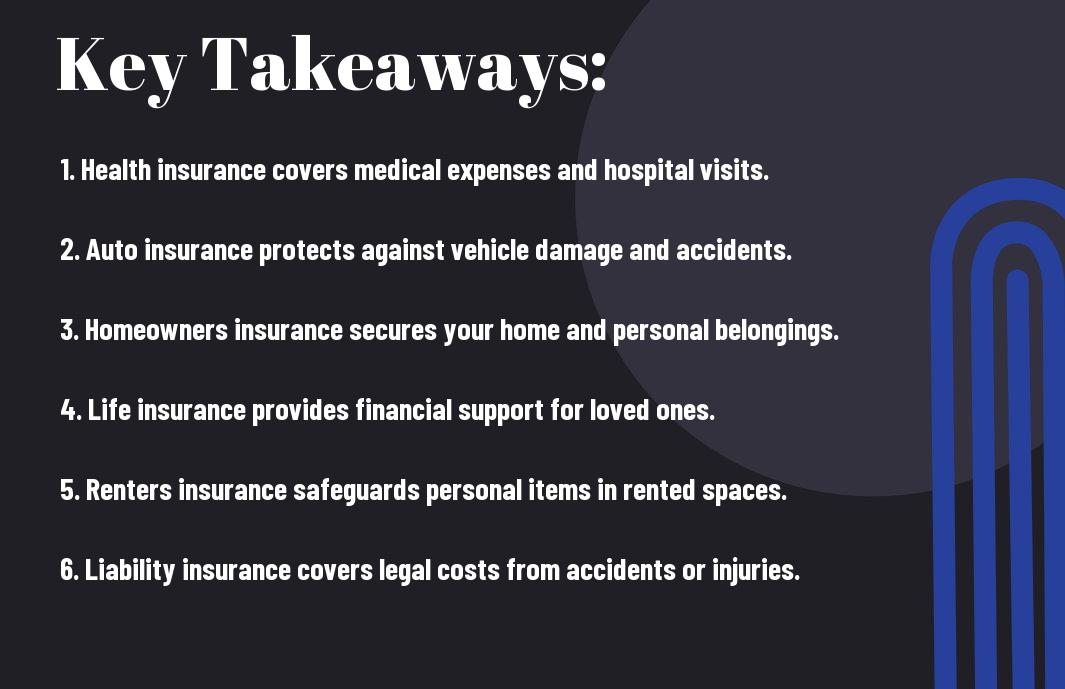Coverage is imperative to protect you and your assets from unforeseen events. Understanding the major types of insurance coverage can help you make informed decisions about your needs. In this blog post, you will learn about different insurance options available, their benefits, and how they can safeguard your financial future. By the end, you’ll have a clearer picture of which coverage types might be right for you.
Key Takeaways:
- Insurance comes in various types, including health, auto, home, and life insurance, each designed to protect against specific risks.
- Understanding the details of each insurance type helps you choose the right coverage for your needs and budget.
- Review your insurance policies regularly to ensure they meet your current situation and make adjustments as necessary.


Understanding Insurance
While you may have heard the term “insurance,” understanding it is necessary for making informed choices. Insurance is a way to protect yourself from financial loss. It helps to cover costs that arise from unexpected events like accidents, illnesses, or property damage. By having insurance, you reduce the financial risk you face in everyday life.
What is Insurance?
Along with being a safety net, insurance is a contract between you and an insurance company. You pay a regular fee, called a premium, and in return, the company promises to help pay for covered losses. This agreement can cover various areas, such as health, home, and auto—making it an important part of planning for your future.
Why Do You Need Insurance?
Behind every financial decision is the need for security. You need insurance to protect your assets and ensure your family’s well-being. Life is unpredictable, and accidents or mishaps can happen at any time. Insurance provides peace of mind, knowing you won’t face the full burden of expensive and unexpected costs alone.
With the right insurance coverage, you safeguard yourself against financial struggles. For instance, health insurance can help with hospital bills and treatments when you get sick, while auto insurance protects you in case of accidents. Having insurance can save you from significant financial strain, allowing you to focus on other important aspects of your life. Overall, insurance acts as a safety net, keeping you secure and prepared for whatever comes your way.
Types of Insurance Coverage
You need to understand the different types of insurance coverage available to make the best choices for your protection. Each type serves specific purposes and can be tailored to your needs. Here’s a quick look at major types:
- Health Insurance
- Auto Insurance
- Homeowners Insurance
- Life Insurance
- Disability Insurance
Knowing these types can help you identify what is most relevant for you.
| Insurance Type | Description |
|---|---|
| Health Insurance | Covers medical expenses and treatments. |
| Auto Insurance | Protects against vehicle-related damages. |
| Homeowners Insurance | Covers damage to your home and belongings. |
| Life Insurance | Provides financial support to beneficiaries upon death. |
| Disability Insurance | Offers income replacement if you cannot work. |
Health Insurance
At its core, health insurance helps you pay for medical care. It covers services like doctor visits, hospital stays, and even prescriptions. Different plans offer varying levels of coverage and costs. You should choose a plan that fits your healthcare needs and budget.
Auto Insurance
Insurance for your vehicle provides financial protection against accidents and theft. It usually includes liability coverage, which pays for damages to others if you cause an accident. It may also cover your vehicle’s repairs. Understanding these coverage levels is important to ensure adequate protection.
Insurance for auto vehicles can get complex. Some common types include collision coverage, which pays for damage to your car after an accident, and comprehensive coverage that protects against non-collision incidents like theft or natural disasters. It’s necessary to compare different policies and find one that fits your driving habits and budget best.
Homeowners and Renters Insurance
All homeowners and renters need insurance to protect their property. This type of insurance covers damage to your home or belongings from various risks like theft, fire, or natural disasters. Whether you own your home or rent one, having insurance can save you money in case of loss or damage. It’s important to choose the right policy that fits your needs and budget, ensuring you have the necessary coverage to feel secure in your living situation.
Homeowners Insurance Explained
On a basic level, homeowners insurance protects your home and personal property. It typically covers damage caused by fire, storms, or vandalism. Additionally, it offers liability protection in case someone gets injured on your property. This type of insurance is often required by lenders before they approve your mortgage. By having homeowners insurance, you can avoid significant financial loss in unexpected events.
Renters Insurance Benefits
An important aspect of renting is having renters insurance, which protects your personal belongings and provides liability coverage. This type of insurance is affordable and can cover incidents like theft or damage from fire. Even though your landlord’s insurance protects the building, it does not cover your things. Renters insurance provides peace of mind, knowing that you can replace your possessions if something unfortunate happens.
Considering how much you invest in your personal belongings, renters insurance is a smart choice. It typically costs less than $20 a month, which is a small price to pay for protection. Many policies also cover additional living expenses if you need to stay somewhere else after a disaster. This means you won’t have to worry about finding a place to stay while your home is being repaired. Protecting your belongings with renters insurance can provide both financial security and peace of mind.

Life Insurance
Once again, life insurance protects your loved ones financially after you pass away. It helps cover expenses like funeral costs, debts, and living expenses. Having life insurance can give you peace of mind, knowing that your family will be taken care of even when you’re not there. This type of insurance is important for anyone who has dependents who rely on their income or support.
Term Life Insurance
Against the backdrop of your financial planning, term life insurance offers coverage for a specific period, usually ranging from 10 to 30 years. If you pass away during this time, your beneficiaries receive a death benefit. This type of insurance is often more affordable than whole life insurance, making it a popular choice for many families.
Whole Life Insurance
Any lasting investment, whole life insurance provides coverage for your entire life. It combines a death benefit with a savings component, allowing your policy to build cash value over time. This means that, in addition to being insurance, it can also be an asset you can borrow against or cash out later in life.
Further, whole life insurance guarantees that your premiums will remain constant, protecting you from rising costs as you age. This type of policy also pays dividends, which can enhance your cash value or be used to offset premium payments. It’s important to evaluate your financial situation and long-term goals when considering this option, as it can serve as a valuable financial tool for your future.

Business Insurance
Not all business risks can be predicted or controlled, which is why getting the right Insurance Types Defined – Office of Risk Management and is necessary. Business insurance helps protect your company’s assets, employees, and overall operations from various risks. It can save you money in the long run by covering unexpected expenses.
Types of Business Insurance
Below is a breakdown of some main types of business insurance:
| Type | Description |
|---|---|
| General Liability Insurance | Covers legal issues due to accidents, injuries, and claims. |
| Property Insurance | Protects your business property from damage or loss. |
| Workers’ Compensation | Covers employees’ work-related injuries or illnesses. |
| Professional Liability | Protects against claims of negligence or mistakes. |
| Business Interruption Insurance | Covers loss of income due to disruption in operations. |
Knowing the different types of business insurance helps you choose the best coverage for your needs.
Why Businesses Need Insurance
One of the main reasons to have insurance for your business is to shield yourself from hefty financial losses. Without insurance, a single lawsuit or disaster could put your company at risk. Having the right policies can save your business from significant trouble down the line.
Plus, business insurance gives you peace of mind. It allows you to focus on growing your business instead of worrying about potential risks. Additionally, most clients and partnerships expect you to have certain types of insurance. Having insurance not only protects your interests but also builds credibility and trust with customers and partners.
### Key Takeaways
– Know the types of business insurance available.
– Protect your assets from unforeseen events.
– Build trust with clients by being insured.
– Stay focused on your business growth with peace of mind.
Specialized Insurance Policies
After exploring common types of insurance, you’ll find that specialized insurance policies cater to specific needs. These policies cover unique situations and assets that are not addressed by standard insurance options. Whether you require coverage for travel, pets, or certain collectibles, specialized insurance can provide you with protection tailored to your specific circumstances.
Travel Insurance
After planning your trip, consider acquiring travel insurance. This type of insurance protects you against unexpected issues, like trip cancellations, medical emergencies, or lost luggage. From flight delays to emergency medical expenses, travel insurance can help you enjoy peace of mind during your travels.
Pet Insurance
One way to care for your furry friends is through pet insurance. This type of insurance helps cover medical expenses for your pets, ensuring they get the care they deserve without stressing your finances. It can include routine check-ups, surgery, and emergency care, making it easier for you to provide the best possible treatment for your beloved pets.
Insurance for pets can vary widely in coverage and cost. Many plans include options for accidents, illnesses, and even wellness care. You can choose the coverage that fits your budget and your pet’s needs. By investing in pet insurance, you gain peace of mind knowing that you can afford the best care for your four-legged companions, especially in an emergency. Additionally, many insurers offer discounts for multiple pets, so it’s worth exploring options. Protect your pets while keeping your finances in check!
Summing up
So, understanding the major types of insurance coverage is vital for protecting your assets and finances. Whether you need health, auto, homeowners, or life insurance, each type plays a specific role in safeguarding you and your loved ones. By making informed choices, you can find the best coverage that fits your needs. For more details, check out this article on the 6 types of insurance, explained. This knowledge can help you secure the right plans for your life.
FAQ: Breaking Down the Major Types of Insurance Coverage
Q: What are the main types of insurance coverage I should know about?
A: The main types of insurance coverage include health insurance, auto insurance, home insurance, life insurance, and renters insurance. Each of these serves a different purpose and helps protect you or your property in various situations.
Q: How does health insurance work?
A: Health insurance helps pay for medical costs. You typically pay a monthly fee, called a premium. When you need medical care, your insurance helps cover the expenses after you pay a certain amount called a deductible. There are different plans, so it’s important to choose one that fits your needs.
Q: What is the purpose of auto insurance?
A: Auto insurance protects you from financial loss if you have an accident or your car is damaged. If you are at fault, it covers damages to the other driver’s car and medical expenses. If you aren’t at fault, it helps cover your own damages. It’s often required by law to have at least some level of auto insurance.
Q: Why do I need home insurance?
A: Home insurance provides protection for your house and belongings. If your home is damaged by fire, theft, or natural disasters, this insurance helps cover the repair or replacement costs. It also protects you against liability if someone gets hurt on your property.
Q: What is the difference between life insurance and renters insurance?
A: Life insurance provides financial support to your loved ones after you pass away. It can help cover expenses like funeral costs or debts. Renters insurance, on the other hand, protects your personal belongings in a rental property. It covers losses from theft, fire, or other events. While both are important, they serve very different purposes.
Key Takeaways
- Understand the different types of insurance to choose what fits your needs.
- Health insurance is vital for managing medical expenses.
- Auto insurance is often legally required and protects you in case of accidents.
- Home insurance is necessary for homeowners while renters need renters insurance to protect their belongings.
- Life insurance provides support to your family after you are gone.




